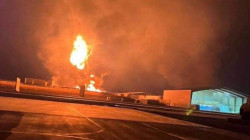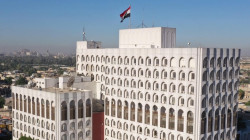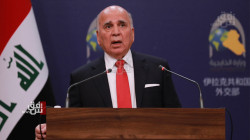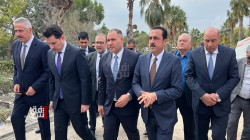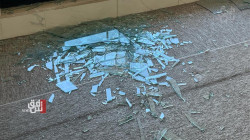"Rocket rains" on Erbil puts Iraqi sovereignty on the line
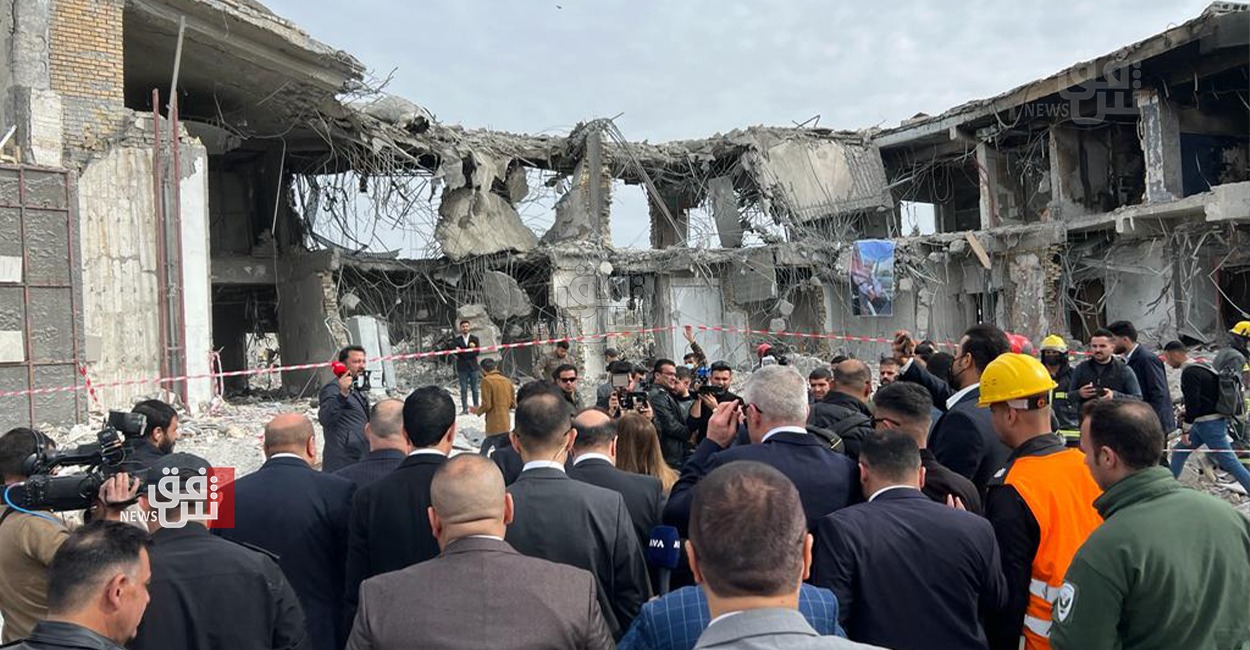
Shafaq News / Iranian missile strikes on Erbil, the capital of the Kurdistan Region (KRI), in recent days have placed the federal government on the brink regarding the concept of sovereignty, urging for "bold" actions beyond mere rhetoric and condemnation, towards actual measures to safeguard the country's security from external conflicts.
Simultaneously, armed factions aligned with Tehran resort to continuous drone bombings on Erbil, coinciding with the ongoing war in Palestine, purportedly to confront American presence, further veiling the Region's skies with missiles.
Since the eruption of the conflict between Israel and Palestinian factions on October 7, 2023, following the surprise attack by Hamas on Israeli settlements in the Gaza Strip, the frequency of threats from several factions and groups "backed by Iran" has escalated, whether in Iraq, Syria, Lebanon, or Yemen.
The official cover for expanding the scope of attacks seemed evident after Iran's Supreme Leader Ali Khamenei, on January 10, 2024, called on the "Resistance Front" to "strike the enemy" wherever its hand reaches.
Diverse targets, strikes, and casualties
A closer examination of the drone map targeting KRI’s skies reveals allegiance to two distinct parties: Iraqi armed factions aligned with Tehran, self-styled as the "Iraqi Resistance" in official statements, and Turkish military actions aiming to settle scores with the Kurdistan Workers' Party (PKK) on Iraqi soil, all to the detriment of the Region's and Iraq's general interest, resulting in destruction and economic losses.
While precise official statistics on casualties remain unavailable, a continuous escalation in drone and missile attacks targeting locations, entities, or individuals in the region has been observed since October 7, 2023, the date of Hamas's attack on Israel, up to the present and likely beyond.
According to data from the Counterterrorism Department, an official government entity in KRI, as well as other official and unofficial sources, 22 drone and missile attacks have occurred in the Region. Turkey accounted for seven drone attacks, while Iran and its armed factions carried out 15 drone and missile attacks since the beginning of the Gaza conflict. The number could increase at any moment, whether from Turkey or the resistance factions.
The targets of the "Turkish-factional" strikes varied. While Turkey specifically targeted individuals or locations affiliated with the PKK, the armed factions' attacks aimed at various sites, notably the bombing of the Harir base at Erbil International Airport, perceived as a target due to the presence of US forces. Additionally, attacks have targeted Peshmerga positions on December 31, 2023. Sometimes, these drones veer off course, leading to incidents like the crash of a drone in the Qalai Naw neighborhood of New Citadel on December 30, 2023, a day before the attack on Peshmerga forces.
Sabrina Singh, Deputy Pentagon spokesperson, announced yesterday that US forces have faced 151 attacks in Iraq and Syria since October 17, with some of these attacks occurring in KRI.
Singh stated, "Militias targeting our forces in Iraq and Syria receive ballistic missiles from Iran," emphasizing they are "armed, supported, and equipped" by Tehran.
The Iranian-Israeli confrontation in KRI
It appears that the so-called loyalist factions, the prevailing term for Iraqi armed factions loyal to Tehran, have taken a back seat, as the Iranian Revolutionary Guard Corps (IRGC) has assumed the task of striking KRI through a missile attack overnight on the 15th to 16th of this month, marking the most prominent and powerful attack among all those previously launched, specifically since the ongoing war in Gaza.
This strike followed precedents of the Iranian-Israeli war in multiple fronts without direct confrontations between them, including the killing of field commander of the IRGC, Rezi Mousavi, on December 25, 2023, in an Israeli airstrike on the Aqraba area in the Damascus countryside. Tehran vowed to respond at the "appropriate time and place."
Furthermore, the explosion in Kerman, Iran, on January 4, 2024, which affected the lives of over 360 individuals, both killed and injured, near the mausoleum of Qasem Soleimani during the commemoration of his assassination, led Iranians to point fingers at Israel despite ISIS claiming responsibility.
As a result of the Iranian airstrikes on civilian areas in the city of Erbil, 11 civilians fell victim, while the IRGC claimed responsibility for these strikes, stating they were "in response to the crimes of the Zionist regime against the Islamic Republic." The most recent being the killing of several IRGC leaders by Zionist fire targeting a Mossad spy base in KRI, which was destroyed by ballistic missiles.
KRI’s Security Council condemned the missile strike conducted by IRGC, targeting civilian areas in Erbil, as a "blatant violation of the sovereignty of the Region and Iraq as a whole."
The Region warns Baghdad of attack risks
Multiple official stances from various entities within the Kurdistan Regional Government (KRG) have expressed rejection of the airstrikes by armed factions and warned of their diverse repercussions on the Region and Iraq as a whole. This includes a statement from KRI’s President, Nechirvan Barzani, on November 7, 2023, where he termed the targeting of facilities housing foreign forces in Iraq as a "serious development," urging the Iraqi Prime Minister, in his capacity as the Commander-in-Chief of the Armed Forces, not to allow lawless entities to create problems for Iraq and KRI, affirming that "this does not serve our interests."
President Barzani also emphasized on November 20, 2023, the necessity of not pushing Iraq towards the ongoing war between Israel and Hamas, stating, "In the event of war, we in Iraq and KRI must act more cautiously than ever, and we must not allow Iraq to be drawn into this war for any reason."
Furthermore, Prime Minister Masrour Barzani also stressed the importance of preserving the security and stability of Iraq, ensuring it does not become a battleground for external conflicts.
While these attacks constitute a violation of Iraqi sovereignty, whether Iranian or otherwise, Kurdish warnings have not received significant response as expected, neither in terms of deterrence nor in constraining the role of militias. This culminated in the bombing of Peshmerga forces by two drones on November 30, 2023, and the Federal Prime Minister Mohammed Shia Al-Sudani directing a comprehensive investigation into the attack on KRI’s Guard in the Saladin Resort in Erbil, describing it as "criminal." This represents the latest stance from Baghdad towards these attacks.
A Critical test for Baghdad
The concept of sovereignty appears to be at stake, at least for Baghdad, following the Iranian attack on Erbil. After the Kurdish leader Masoud Barzani's strongly-worded statement and Kurdish condemnation, which even led to the cancellation of a planned meeting between the Prime Minister Masrour Barzani, and the Iranian Foreign Minister, Hussein Amir Abdollahian, in Davos, and the Kurdish public's response to the airstrikes, which included boycotting Iranian products and Kurdish leaders demanding Baghdad to preserve sovereignty and prevent the skies of the Region from being filled with drones, the spotlight is now on Baghdad.
Following the summoning of the Iranian Charge d'Affaires and statements from the Iraqi Foreign Minister suggesting that Iran cannot confront Israel so it resorts to bombing the Region, the Iraqi "complaint" to the eastern neighbor in the Security Council seems pivotal to assert Baghdad's right to safeguard its sovereignty. This represents a qualitative test for the nature of relations between the two countries. However, doubts linger about the execution of this step, despite Prime Minister Mohammed Shia Al-Sudani's statement regarding the incident, where he deemed the Iranian airstrikes as "aggressive acts" and "a dangerous development undermining the strong relation between Baghdad and Tehran."
